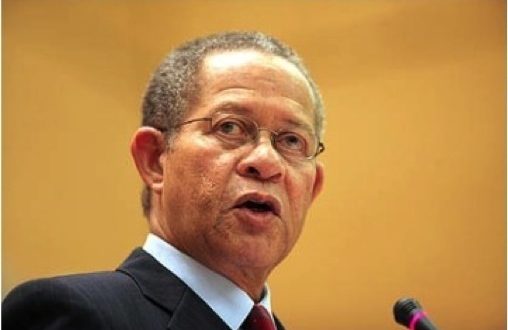The Head of the OAS observer mission at the March 2nd elections, Bruce Golding yesterday expressed concern that an accurate result has not been determined six weeks on and said this was crucial to restoring Guyana’s position as an “internationally respected democracy”.
Golding’s reference to Guyana’s democratic standing demonstrates how quickly the international community is drawing a judgement on the disputed elections and the perils that might lie ahead for the country.
In a press statement, Golding, a former Prime Minister of Jamaica, also called for care in the upcoming recount and the exclusion of any officials who have shown partiality. There have been calls for several officials to be excluded from the recount because of their questionable behaviour, particularly the District Four Returning Officer Clairmont Mingo.
Coming from a former CARICOM Leader and the Head of the Organisation of American States (OAS) observer mission here, Golding’s statement will further intensify the pressure on GECOM and the incumbent, President David Granger to not stand in the way of the finalizing of the election result.
Golding, whose OAS observer team withdrew from Guyana in protest over the fictitious numbers for Region Four that had been produced by Mingo, also lambasted the timeframe that had been presented by Chief Election Officer Keith Lowenfield for a recount of the votes.
“The proposal by the Chief Election Officer that would have required five months to recount less than 500,000 ballots is unheard of in any democracy and would be unacceptable under any circumstances. The Mission notes that the Guyana Elections Commission (GECOM) has ordered that a revised timetable be prepared”, Golding declared.
Lowenfield has been soundly criticised for presenting what has been termed an absurd proposal and has cast blame on an opposition-nominated GECOM commissioner for setting narrow terms for the staffing of the process.
Declaring that the present electoral impasse was not insoluble, Golding, who served as Prime Minister between 2007 and 2011, said that the OAS mission is prepared to help to ensure that “Guyana’s position as an internationally respected democracy is restored and preserved”.
The OAS has already expressed interest in being present for the recount of votes.
Golding also raised concerns that the election result had not been finalized in the context of the current COVID-19 public health crisis.
The statement said that he “remains concerned that, after more than six weeks, an accurate and credible result that would allow a duly elected government to assume office has not been determined. This is especially regrettable in light of the global health crisis that requires every government to take decisive actions and to be able to command the confidence of its people in order to mobilize them in thwarting the spread of the Coronavirus”.
He added that the political crisis in Guyana is not intractable.
“As the Mission had previously noted – and to the credit of all the stakeholders, especially the voters themselves – the casting and counting of ballots on March 2 was conducted in a peaceful and transparent manner. All that remained was for the count from each polling station to be accurately tabulated and declared. There is an abundance of evidence that this was not done in the case of Region 4 and this has led to the decision for the ballots in all ten regions to be recounted”, he declared.
He called for transparent and consistent procedures for the recount and that the instructions to election officials conducting the process are unambiguous and based on the provisions of the relevant laws. Golding also urged that the public be fully informed of the methodology to be used.
In particular, the Mission urged GECOM to take care to ensure that:
• the officials to be engaged in the recount are selected based on their impartiality and those who have displayed partisan behaviour are excluded;
• the duly authorized representatives of political parties and accredited observers are allowed to see (but not handle) each ballot;
• the legal provisions for challenging the determination of ballots are fully respected;
• an ascertainment is made as to whether the number of ballots cast corresponds with the number of persons recorded as having voted;
• the result of the recount for each polling station is compared with the Statement of Poll signed by the Presiding Officer.






